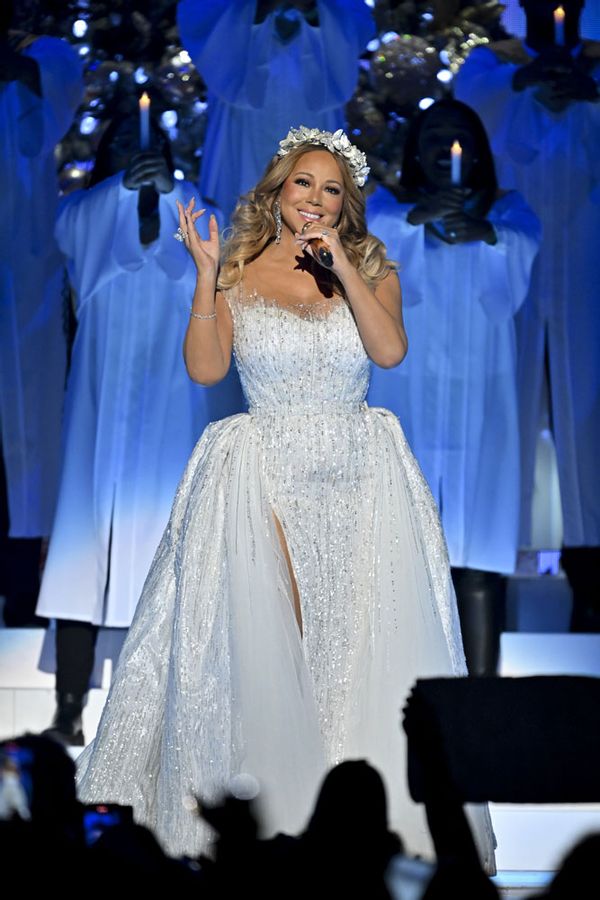
Where other pop music icons would risk the wrath of a public sick of Christmas commercialism creeping into the spooky season, Mariah Carey sailed right in on Halloween.
An Instagram video shows her dressed like a sexy witch riding a stationary bike looking seriously glamorous but mainly severe, a wicked witch dressed to make Dorothy Gale gag.
Shortly she begins to cackle, shaking the black locks of her wig. Suddenly with a smash cut and a sparkly flash, she's Yuletide Mariah, a vision in red and white astride a life-sized reindeer plushie. With a gleeful toss of her golden mane, the Songbird Supreme belts out in the most exultant alto soprano, "It's t-i-i-i-i-i-i-me!"
In the same way we can count on the arrival of Dec. 25, Mariah Carey, Queen of Christmas, is inevitable. She knows this. Unless your family name is Grinch, to millions of people around the planet, she is synonymous with Christmas, thanks to the recording phenomenon that is "All I Want for Christmas Is You."
The modern, secular Christmas standard is one of the unlikelier pop music success stories of recent times, starting with the fact that its wildest success didn't begin until a couple of decades after its 1994 release.
Mariah Carey, Queen of Christmas, is inevitable.
Today Carey's song might as well be the unofficial shopping anthem of the holiday season, since it sonically decks the halls of retail soundtracks across the country, reigning over such modern holiday classics as Paul McCartney's 1979 classic "Wonderful Christmastime" or The Waitresses' spaced-out 1982 jingle "Christmas Wrapping" or Run D.M.C.'s 1987 hip-hop banger "Christmas in Hollis."
We associate these songs with the type of '80s-era neon cheer with which Generation X and older Millennials may identify. But Carey's song, which she co-wrote with pop music producer Walter Afanasieff, hooks into a broad range of ages and backgrounds for reasons many music experts can explain and others might deduce.
Much of its success can be attributed to the concepts that went into its creation, some of them musical and some of them entirely emotional. Each of these ideas taps into something instinctual that affirms Carey's artistic skills and her innate knowledge of the weight this time of year has in our culture: its story is an extension of Carey's personal history, one to which millions of people can relate. Hence her relatively recent popularity as a go-to TV holiday special star, her title being CBS' "Mariah Carey: Merry Christmas to All!"

That two-hour primetime concert special joins an expanding library of small-screen specials related to Carey's holiday hit, including the 2017 animated special "All I Want for Christmas Is You," her 2020 one-off for Apple TV+, "Mariah Carey's Magical Christmas Special" and its 2021 follow-up "Mariah's Christmas: The Magic Continues." The U.S. Trademark Trial and Appeal Board may have denied her exclusive legal rights to the Queen of Christmas moniker, but she's devoted to making sure we don't forget why people assigned the term to her in the first place.
"I have such an emotional connection to Christmas. And it wasn't about the gifts. It was just about the hopefulness of the holiday season and just feeling, like, in the spirit, and the need for me to express myself and make a song that made me feel happy at the holidays," she said in an Amazon Music short movie about the single.
You'd have to read between the lines and know something about Carey's personal history to recognize those harmonizing strains in the song's appeal.
Carey's effort to parlay the song's late-blossoming success into claiming the unofficial Queen of Christmas title acknowledges another aspect of the holiday season that receives less focus, which is the importance some people place on claiming seasonal cheer in their healing process.
Carey's most ardent fans – her Lambily, she calls them – know many details about her personal history. Others have only recently begun to learn about Carey's life as she's begun to open up in interviews and her 2020 memoir "The Meaning of Mariah Carey." In conversation with Megan Markle on her "Archetypes" podcast, Carey talks about an itinerant childhood where she had to move with her divorced mother multiple times. "So I had nothing. No money, you know, nothing," she said.
In the "All I Want for Christmas Is You" short, she mentions unhappy Christmases with a highly dysfunctional family, and is careful to clarify that her mother tried to alleviate some of that sorrow, although sometimes all she could do was wrap up some fruit to put under the tree. When she started celebrating Christmas on her terms, she said, she was determined to ensure hers would never be like that.

Between this and knowing that "Merry Christmas" was produced in the early years of her marriage to the famously controlling Tommy Mottola, viewing "All I Want for Christmas Is You" as an expression of yearning, a pointed shout of joy slicing through an extremely grim time in her life, provides the song with added resonance.
This is also present in Apple TV+'s "Mariah Carey's Magical Christmas Special," a mid-pandemic spectacular featuring the singer in an assortment of glittering gowns belting out an array of Christmas standards, joined for some by a small galaxy of stars. Presented as a Christmas story told by elves, one of whom is played by Billy Eichner, Carey's mission is to restore the Christmas spirit to a world bereft of it.
"All I Want for Christmas Is You" doesn't make most people want to throw their whole body through a plate glass window to escape it.
Provided you saw it (and you still can; it remains available on the service) you may have missed a significant moment, the opener, where, in her fantasy Manhattan penthouse, Carey and her two children are joined by a little girl she calls Mimi – the singer's nickname.
Mimi sadly tells Carey that her family doesn't even have a Christmas tree. The songstress responds by giving the child the ornament she says is her favorite one. That speaks to a small wish many of us have to comfort our younger selves with the knowledge that life will get better. Carey's success, particularly as it relates to this song, is an extreme and unlikely version of that.
The main wonder of "All I Want for Christmas Is You" is that it became popular at all. In 2021, the Recording Industry Association of America gave it the Diamond Award in recognition of 10 million sales and streaming units in the United States, the first and only holiday song to achieve that status. It took 25 years for the single to reach the No. 1 spot on Billboard's Hot 100, becoming only the second time in 60 years for a Christmas song to hit the top spot on the main chart. The first was "The Chipmunk Song (Christmas Don't Be Late)," released in 1958 by David Seville and the Chipmunks.
Unlike that tune, "All I Want for Christmas Is You" doesn't make most people want to throw their whole body through a plate glass window to escape it. At the very least, it's tolerable.
As the lead single on Carey's first holiday album "Merry Christmas," which was also her fourth studio release, "All I Want for Christmas Is You" was viewed as a risk. Then again, so was the entire album. Carey was reluctant to release a holiday album early in her career, especially at a time in the music industry; generally, holiday albums were thought of as projects musicians release when their careers were winding down.
Not only was "Merry Christmas" defying convention in that respect, but it was also promoting a new song in a season dominated by nostalgia. Without any memory to associate with a new song, its chances of hitting with a wider audience are slim.
Carey's holiday contribution might have been relegated to the Island of Misfit Songs if not for its rollicking cover by Olivia Olson in 2003's "Love, Actually," a Christmas movie whose popularity expanded throughout the aughts, exposing Carey's tune to millions of folks who might have otherwise passed it by. Just like that movie found its magic in unexpected romances, highlighted by one destined to be unrequited, "All I Want for Christmas Is You" is a love song to someone who the song's protagonist hasn't won yet or may never win.
Another explanation for its perpetual seasonal popularity and its late blossoming is even simpler. Like any beloved Christmas movie or holiday tune, "All I Want for Christmas Is You" is a song that doesn't belong to any decade or era.
In that music doc Carey and several experts, including super-producer and longtime "American Idol" judge Randy Jackson, point out the song's 1950s and 1960s girl group homages. She explains she was going for her own version of Phil Spector's Wall of Sound. That creative swing resulted in a pop song that for most people, spurs spontaneous sing-a-longs and head-bopping from the beginning of November through New Year's Day nearly three decades after it came into the world.
Back then we may not have fully appreciated the glorious rebuke of sorrow in its sweet bounciness, or even the extensive longing in the line about not wishing for snow, knowing that the singer herself always wishes for a holiday blanketed in white. Surely we do now after living through such a dark time and a succession of anxious Decembers. If all people want is to enjoy this song a few dozen times for a few weeks per year that's because its creator gets how they're feeling, and wants us to know it's to put that bleakness to the side for a little while. Indeed, it's time.
"Mariah Carey: Merry Christmas to All!" debuts at 8 p.m. Tuesday, Dec. 20 on CBS and streams on Paramount+.
https://www.youtube.com/watch?v=qQD7CtKZc4Q







